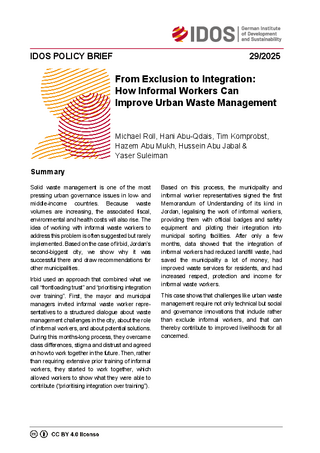From exclusion to integration: how informal workers can improve urban waste management
Roll, Michael / Hani Abu-Qdais / Tim Kornprobst / Hazem Abu Mukh / Hussein Abu Jabal / Yaser SuleimanPolicy Brief (29/2025)
Bonn: German Institute of Development and Sustainability (IDOS)
DOI: https://doi.org/10.23661/ipb29.2025
Solid waste management is one of the most pressing urban governance issues in low- and middle-income countries. Because waste volumes are increasing, the associated fiscal, environmental and health costs will also rise. The idea of working with informal waste workers to address this problem is often suggested but rarely implemented. Based on the case of Irbid, Jordan’s second-biggest city, we show why it was successful there and draw recommendations for other municipalities.
Irbid used an approach that combined what we call “frontloading trust” and “prioritising integration over training”. First, the mayor and municipal managers invited informal waste worker representatives to a structured dialogue about waste management challenges in the city, about the role of informal workers, and about potential solutions. During this months-long process, they overcame class differences, stigma and distrust and agreed on how to work together in the future. Then, rather than requiring extensive prior training of informal workers, they started to work together, which allowed workers to show what they were able to contribute (“prioritising integration over training”).
Based on this process, the municipality and informal worker representatives signed the first Memorandum of Understanding of its kind in Jordan, legalising the work of informal workers, providing them with official badges and safety equipment and piloting their integration into municipal sorting facilities. After only a few months, data showed that the integration of informal workers had reduced landfill waste, had saved the municipality a lot of money, had improved waste services for residents, and had increased respect, protection and income for informal waste workers.
This case shows that challenges like urban waste management require not only technical but social and governance innovations that include rather than exclude informal workers, and that can thereby contribute to improved livelihoods for all concerned.


